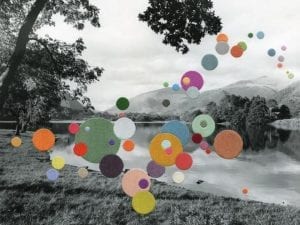In 1978, Zofia Rydet was 67 years old. By this time, she was already an established photographer. She’d been a member of the Gliwice Photographic Society for almost 25 years, presented two major exhibitions and, in 1976, was awarded the Excellence de la Fédération Internationale de l’Art Photographique. Despite this illustrious career, it was the project she began in 1978 that would prove to be her magnum opus. The artist set out on a mammoth task: to photograph the inside of “every” Polish household. Sociological Record spanned 12 years, during which Rydet captured ordinary, unsung communities across the country. The result is a comprehensive documentary portrait of domestic life, unparalleled in ambition or scale.

Now, the series is on display at The Photographers’ Gallery, London. The landmark show is the first substantial exhibition of Sociological Record in the UK. It brings the series to new audiences while highlighting prints made in her home darkroom, giving the work a distinctly personal feel. Additional ephemera bring Rydet’s world to life, with items from her archives and original publications, as well as Endlessly Distant Roads, a 1989 documentary of the artist’s life from Polish filmmaker Andrzej Różycki. Also featured are Anna Beata Bohdziewicz’s documentary portraits of Rydet at work. The display is part of the UK/Poland Season 2025, a diverse programme of over 100 multi-artform events in 40 cities across both countries. The Season, organised by the British Council and Adam Mickiewicz Institute, celebrates the relationship between the two nations and creates space for future collaboration.

Rydet’s childhood was defined by tumult. Born in the Austro-Hungarian Empire in 1911, she lived under the brutal Nazi occupation during WWII before the region was absorbed into the Ukrainian Soviet Socialist Republic. Her family fled across the newly defined Polish borders, settling in Upper Silesia. It’s here that she would hone her passion for lens-based art, working as a photography teacher and sending her images to international competitions. The series she created are clear precursors to Sociological Record, spotlighting the humanity and individuality of those often overlooked by society. Her seminal book Little Man collected her many portraits of children, taken in Albania, Bulgaria, Czechia, Egypt, Lebanon and Yugoslavia. Here, Rydet avoids the trap of oversimplifying childhood; instead, she portrays children having a life as complex and nuanced as their grown-up counterparts.

Sociological Record continues this commitment to representing all communities with dignity and respect. Rydet cut an unlikely figure on her field trips to different regions, a diminutive woman travelling by bus or with the help of friends who could drive her. She’d approach houses unannounced, knock and warmly introduce herself, asking occupants if they would like to be part of the project. The artist was armed with a newly acquired wide angle lens and flash, meaning she could capture often darkened interiors of homes and their inhabitants in great detail. Sitters were asked not to smile but look straight ahead into the camera lens. Each house is richly adorned, with walls covered in a combination of traditional décor and 1980s pop culture references, like Sting and The Police. One particularly striking picture sees an elderly man, smartly dressed, sitting on a neatly made bed. He is surrounded by countless photos, packed so tightly together that the wall is rendered invisible, whilst household items are suspended from the ceiling.

As the series progressed, Rydet would identify different categories that repeatedly emerged: Women on Doorsteps; Professions; The Ill; Road Signs; Windows; Houses; and Televisions. Each one highlights the commonality between different households, regions and families. She also began to recognise more philosophical themes, such as Presence, noting the pervasiveness of the Polish Pope John Paul II’s image, who was inaugurated in 1978. It was long said that “99% of Polish children are baptised Catholic,” and even in the 2011 census, 96% of respondents claimed they were Roman Catholic. Signs of the country’s deep-rooted religion are evident throughout Rydet’s work. One shot of an elderly man shows a large wall hanging depicting Christian figures placed above his bed. It’s surrounded by five other carefully framed religious pictures. The only addition is a singular wedding portrait. Other themes included The Myth of Photography, focusing on the central position and significance of family portraits within the home, such as traditional, hand-painted studio photographs of married couples in homes with little decoration.

Rydet continued working on Sociological Record until 1990, seven years before her death at the age of 86. She said of her hopes for the work: “Even if they don’t publish it…this will remain, not art perhaps, but a document of the times.” Without question, Rydet has achieved her aims. The project is a monument to a bygone era, celebrating the culture, households and individuals who make up the fabric of a nation. Her empathetic approach places her as one of the great documentary photographers of the 20th century, reminding us that the story of a country is told most powerfully through the intimacy of the everyday.
Zofia Rydet: Sociological Record is at The Photographers’ Gallery, London until 22 February: thephotographersgallery.org.uk
Words: Emma Jacob
Image Credits: All images from Sociological Record © Zofia Rydet, courtesy of the Zofia Rydet Foundation.




